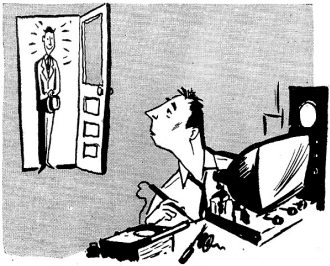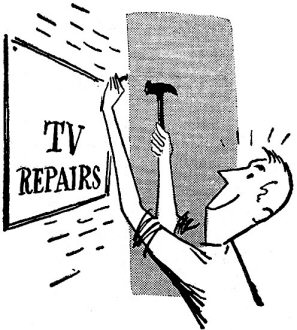|
March 1954 Radio-Electronics
 [Table of Contents] [Table of Contents]
Wax nostalgic about and learn from the history of early electronics.
See articles from Radio-Electronics,
published 1930-1988. All copyrights hereby acknowledged.
|
When beginning to read
this 1954 Radio-Electronics magazine article, I almost missed the
uniqueness of the author's name: Henry
Farad. Usually something like that appears in an April edition, but this being
March, I figured it was just a clever device used by whomever really wrote the
story. For anyone trying to enter the field of electronics repair in that era,
reading this piece must have been discouraging, and Mr. Farad makes that clear
up front by stating, "He is up against a problem as old as civilization - he
hasn't been able to find a job because he has no experience; he can't get any
experience because he can't find a job!" Profit margins were very low in repair
work due to the usually undeserved reputation of service shops as being rip-off
joints. Taking on an apprentice was a luxury few could afford since the payoff
would take so long. Radio, TV, record players, etc., were not generally
serviceable by laymen (except for swapping out vacuum tubes), and the throw-away
mindset was not yet possible because of how relatively expensive those sets
were. Accordingly, you might think knowledgeable servicemen would be highly
revered for having invested the time and money in preparing themselves for
bringing customers' beloved entertainment devices back to life, but not so. Of
course the same situation plays out today for plumbers, electricians, HVAC
techs, auto mechanics, etc. For a different perspective on the subject, read
some of the
Mac's Radio Service Shop stories.
"Experience is the best teacher, but she keeps a dear school."
 By Henry Farad By Henry Farad
He drifts into my TV repair shop two or three times a year. He's a different
individual each time, but his problem is always the same. He has studied TV theory
until it's running out of his ears; what he needs now is on-the-job experience to
make that theory worth something in terms of dollars and cents. He is up against
a problem as old as civilization - he hasn't been able to find a job because he
has no experience; he can't get any experience because he can't find a job!
I can't help him directly. I'm a small-bore operator on a side street; my shop
is in front of my home. You know the setup: in slack season not half enough work
for one man; when things get snowed under, a few 12- or 14-hour days clear the decks.
I get by, which is just fine. But hired help I can't use.
However, I can explain how I got my experience after I'd run up against the identical
problem. Like many others, I learned my TV theory at home in my spare time; making
a living occupied most of my daylight hours. My only teachers were books, magazines,
and a study course.
Inevitably, as does every student, I reached a point where the books began to
blur. I'd absorbed all the wordage I could handle for the time being. I needed actual
contact with TV sets - preferably in bad order.
I could have gotten that contact in a residential TV school, but I had a family
to support and no rich uncles. A job as a helper or apprentice in a TV shop was
another possibility, but a shop helper's pay is too low and his progress not fast
enough for any but single, unburdened individuals. I solved the problem by creating
my own experience. The method is simple and relatively cheap; it can be duplicated
anywhere. It can supply any student - as it supplied me - with experience at exactly
the right pace; never too fast, never too slow; whenever he wants it - evenings,
week-ends, any time.
My first step was to become what amounted to a part-time dealer in TV junk. This
was simple enough. I inserted a classified ad in a local paper, offering to buy
old TV sets - any size, shape, or condition for cash. You don't have to be a big
dealer to do this. I put a $50 maximum on my offer, thus side-stepping big stuff;
I never paid more than $30 for any of the ten-inch clonkers I dragged home. $30
was my top a couple of years back - a $20 maximum would be more in line with today's
situation.
 Having dragged a relic home, I proceeded
to restore it to working condition, which frequently took a little doing. As might
be expected, there was something badly amiss with everyone of my prizes. Some produced
neither raster nor sound; some made with fearful planing-mill noises. Others were
inhabited by gremlins or some of the many ailments common to TV sets. Sad cases
everyone, but you don't learn TV repairing by working with sets in good order. Assuming
a receiver hasn't suffered a major burn-up (sniff well before buying), and hasn't
been robbed of tubes, then the worse its condition the better for the student seeking
experience. Having dragged a relic home, I proceeded
to restore it to working condition, which frequently took a little doing. As might
be expected, there was something badly amiss with everyone of my prizes. Some produced
neither raster nor sound; some made with fearful planing-mill noises. Others were
inhabited by gremlins or some of the many ailments common to TV sets. Sad cases
everyone, but you don't learn TV repairing by working with sets in good order. Assuming
a receiver hasn't suffered a major burn-up (sniff well before buying), and hasn't
been robbed of tubes, then the worse its condition the better for the student seeking
experience.
The actual, hard-rock experience I gained in repairing those boxes was only part
of the program. My next stop was to twist every nonoperating control I could find,
with the idea of getting everything as far out of kilter as possible. Then I restored
everything to normal, sometimes repeating the process several times. The further
I progressed the bolder I became; the deeper I dug into my clonkers. I introduced
defects and observed the symptoms. I practiced signal-tracing and alignment, to
mention just a few of my earlier experiments. Then, after I'd milked a chassis dry
of information I sold it down the river, as detailed a little later.
In one corner of my over-sized garage I fought first one piece of junk back into
working order and then another - and another. A v.t.v.m. with a couple of probes,
a tube tester, and some early printings by Rider and Photofact made up my equipment,
plus the usual hand tools.
It's no fun - not at the start. Not for the student completely on his own, with
not a soul to give him a lift when he gets stuck in the mud, which is often. It's
not the most efficient method in the world, either; it involves frustrated hours
of doing things the wrong way, stupid mistakes, wrong approaches, errors of both
omission and commission. There were times when I'd have sold out for a fraction
of the inventory.
But you can say this about the method - it works! It produces real, valuable
experience. Moreover, it sticks with you, as does anything acquired the hard way;
there's no time wasted simply memorizing. Another advantage is that you have neither
employer nor impatient customer breathing down your neck - a handicap which can
make even an experienced mechanic sometimes black out.
I started out in my garage loaded with theory but inclined to go numb from the
neck up the moment I removed the back of a defective TV set. The first time I pulled
one out of a cabinet and turned it over I recall sitting there for half an hour,
just gawking, with a gone feeling at the pit of my stomach, wondering why I'd ever
started this. The first few times I compared a schematic with a chassis I got lost
so fast it was worse than pitiful. No fun at the start.
Little by little, however, stage by stage, I acquired competence and confidence,
a backlog of experience. I discovered head-on attacks don't payoff in TV repairing.
Strategy is the key to the jackpot; knowing when to attack a repair job via the
dynamic approach, checking a.c. components with a v.t.v.m. or scope, and knowing
when to use the static approach, routinely checking socket voltages, capacitors
or resistors. It means knowing when to use a tube-tester and when to rely entirely
on substitution. The difference between the strategic and the head-down approach
is the difference between minutes and hours in wrapping up a repair job.
The strategist is always changing pace. He hangs onto an idea or a deduction
just so long, then if it fails to pan out he dumps it. This is an attitude of mind
to be cultivated. Let me illustrate the disadvantages of not having this attitude,
by using a hypothetical Joe Doakes. Confronted with a fairly tough case of TV trouble,
Joe looks the situation over and makes a quick deduction as to the probable cause.
So far so good. However, Joe's test gear promptly reports that everything is under
control in the suspected area. This is where real trouble starts.
 Instead of changing pace and developing
a second deduction, Joe stubbornly makes another pass at the original target. When
this gets him nowhere, he promptly goofs off. Two hours, three hours later you may
find him still working over the same group of components. Meanwhile in the process
of checking and re-checking it's quite possible Joe's test gear has indicated the
cause of the trouble. But because Joe is operating strictly under Condition Goofoff,
he pays no attention to what the test gear tells him. He ignores it, knot-headedly
continuing his original line of attack. Instead of changing pace and developing
a second deduction, Joe stubbornly makes another pass at the original target. When
this gets him nowhere, he promptly goofs off. Two hours, three hours later you may
find him still working over the same group of components. Meanwhile in the process
of checking and re-checking it's quite possible Joe's test gear has indicated the
cause of the trouble. But because Joe is operating strictly under Condition Goofoff,
he pays no attention to what the test gear tells him. He ignores it, knot-headedly
continuing his original line of attack.
After lunch or possibly the next day, he'll come to, kick himself, and proceed
to repair the TV set in a normal manner. I goofed off like this more than once.
Others far more competent than I have done exactly the same thing.
The calm, cool, and collected attitude is about twenty-five percent of the top-drawer
technician. It increases output and accuracy, it inspires that precious gem, customer
confidence. Move slowly and deliberately; it will reduce the number of chassis unnecessarily
pulled, and the number of 6AU6's popped by forgetting to return the filament knob
on the tester back from 12.6V. In short, the less haste the more speed.
I once pulled a chassis and fought with it for an hour, trying to discover the
reason for no-sound. I was knee-deep in gear and half-strangled with test leads
when I noticed at long last that the record-player switch had somehow been snapped
over to PHONO.
Then there was that memorable Philco on which I wasted more than half a morning
trying to find out why the over-all bandwidth had decreased to about 2 megacycles.
(Yes, I checked and re-checked the tubes.) The trouble, it eventually developed,
grew out of the fact that a 12AU7 and a 12AV7 were planted side by side in the front
end - and someone had swapped them! Later I discovered the owner had taken some
of his tubes downtown for testing before calling me in, which shows to go you -
never take anything for granted.
When nothing produces results within a reasonable time, start taking wild shots
in the dark. I am reminded of a certain series-filament conglomeration wherein all
the symptoms of an open grid circuit in the C-R tube were produced by a heater-to-cathode
short in the damper! Then there was that frightful case of horizontal nonlinearity
which was caused by trouble in a 6SN7-GT horizontal oscillator which checked perfectly
in my tester. In this case and as an added unattraction, the horizontal drive capacitor
had insanely taken over the function of a horizontal centering control!
Anyway, and as I started to say some time back, little by little, stage by stage,
headache by headache, I acquired competence and confidence at my garage workbench.
If I've made it sound rough, I can only say it is indeed rough - at the start.
In the end, I no longer crept timidly up to each sour TV set, wondering whether
this one would be my Waterloo as I began to probe its innards.
Oh, sure, you get thrown for a loss every so often by some box tougher than you,
but repairing the vast majority of TV sets is so simple - even for a halfway competent
technician - that it sometimes seems a shame to take the money(?).
I bought a lot of clonkers, but my actual inventory at anyone time was seldom
more than one TV set. As soon as I milked one dry, it was promptly sold.
I'd have a really good story here if I could say these transactions showed a
nice profit, but not so. I had to price those boxes low enough to insure prompt
disposal, and I had to get cash. The prices I got were anything but fancy; Considering
the cost of advertising, mileage, replaced tubes and components, I lost something
on every deal - around $7.50 per box.
Holding on for higher prices could have showed a profit possibly, but I wasn't
necessarily trying to make money; my objective was getting experience. Keeping a
constant supply of TV cadavers coming my way was the all-important item.
I started my project with a v.t.v.m. and a tube-tester; eventually I acquired
a scope, sweep and marker generators, 1,000-kc crystal marker oscillator, grid-dip
meter, wattmeter, capacitance-bridge, short wave receiver to monitor WWV, complete
set of service manuals, and trimmings. You don't have to be a big dealer to do this.
I bought my gear one item at a time, in kit form wherever possible, because I couldn't
afford ready-made gear. Moreover the purchases were spread out over a considerable
period of time - a year or so all told.
Slow work? Well, acquiring electronic know-how is a slow process. The TV student
in a hurry is licked before he starts; never less than a year and often two years
must elapse before he gains enough ground to tackle general repair work.
Also pretty well licked before he starts is the TV student who expects to draw
a salary while he gets his practical experience. Students pay considerable sums
to acquire theory, and without protest. However, the thought that practical experience
must also have a price tag is something which seldom occurs to them. But that's
what it amounts to when the inexperienced technician - sharp though he may be in
theory - tries to hire out in Slowblow's TV shop.
Apprentice training works out well enough in some occupations, where other services
may be rendered while the student learns.
Simply observing a TV repairman at work is of little value to the novice, assuming
the repairman is not doubling as instructor. Ninety-nine per cent of the effort
is quite invisible, consisting of mental processes.
If Slowblow takes him as a bona-fide apprentice or learner, the novice will be
in Slowblow's way for a long time; he's only half a technician. Slowblow would be
forced to make up his deficiencies. Slowblow must spend many hours teaching the
novice the techniques he needs; inevitably the novice will make numerous and sometimes
expensive mistakes. In short, he'll be a student drawing wages for being instructed!
The only practical way Slowblow can hire the student is on the basis of shop
helper. Most of the time he will put up aerials; pull chassis, act as general man-of-all-work.
Thus the student earns his wages, but acquiring experience is strictly hit-or-miss,
at a woefully slow rate.
Hence, unless he's exceptionally lucky, or unless he can manage to take a residential
course in a TV trade school, the average Joe must buy his experience - and the only
visible method is along the general route I've been outlining. The cost of buying
experience this way is never more than a few hundred dollars, with payments spread
out over a rather long period.
Even if the student does not plan to go into business for himself, buying all
this test gear is actually a necessity. Considering the strong economic position
enjoyed by the experienced, competent TV service technician, a few hundred dollars
represents a trivial investment indeed.
Posted May 11, 2022
|































